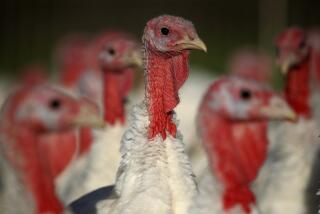Widely condemned cattle-killing method is used by kosher meat firm’s supplier
Reporting from New York — Two years after U.S. kosher-food authorities said they wanted to stop use of a cattle-killing method widely criticized as inhumane, the country’s largest seller of kosher meat is importing beef from a South American plant that employs the technique, import records and an undercover video show.
The video, recorded in December by animal-rights activists from People for the Ethical Treatment of Animals at a slaughterhouse in Uruguay, depicts cows being lifted by a chain attached to one leg and then restrained by workers for the slaughter.
PETA identified the slaughterhouse as Frigorifico Las Piedras outside Uruguay’s capital, Montevideo. The plant is a major supplier of Alle Processing in New York, according to import records.
Alle’s owner, Mottel Bergman, declined to comment on the methods used at Las Piedras, as did Enrique Badano, the South American firm’s export manager.
Meat from Las Piedras and other South America factories is used to produce most of the processed kosher meat consumed in America, including deli favorites such as salami and pastrami, kosher authorities say.
The Orthodox Union, which runs the largest U.S. organization certifying food as conforming to Jewish dietary laws, has rabbis observing the procedures at Las Piedras.
An official of the organization confirmed that the plant used the controversial killing method, “shackle and hoist.”
In 2008, after PETA released a video taken at another South American plant that exports kosher beef to Israel, the Orthodox Union said it wanted to stop certifying meat from cows killed with the shackle-and-hoist technique.
This week, Menachem Genack, chief executive of the group’s kosher certification unit, said the organization still hoped to end use of the method.
But because the previous largest U.S. kosher supplier went out of business in 2008, Genack said the group was not willing to endanger this country’s supply of kosher beef.
“We have to make sure that kosher slaughter is done in as good a fashion as possible -- but I want to do that in a way that doesn’t disrupt a very fragile industry,” he said.
As a result, Genack said, the Orthodox Union is following the lead of Israel’s kosher authorities, who allow the shackle-and-hoist method because they require that cows be slaughtered while upside down if their meat is to be considered kosher.
There is a mechanical pen that can keep the animal inverted while it is killed, but it is expensive to install.
Such a pen is said to make it easier to confirm that the cut applied to the cow’s throat follows kosher requirements.
Yona Metzger, one of Israel’s two chief rabbis who oversee kosher certification in the Jewish state, two years ago promised an effort to stop use of shackle-and-hoist slaughtering.
Ezra Harari Raful, head of meat imports for the chief rabbinate, said the Israelis were pressing for change but couldn’t control the South American factory owners.
“It can only be implemented by decisions of the owners of the ritual slaughterhouses,” Raful wrote in an e-mail. “I believe that the administrators will slowly change their practices from how it currently exists to the new methods.”
But Joe Regenstein, a food science professor at Cornell University and kosher-meat expert, blamed Metzger for not forcing change upon the Israeli companies that control most of the kosher meat production in South America.
“Nothing has happened,” Regenstein said. “Unfortunately, we’re tainted by it.”
Temple Grandin, a professor of animal science at Colorado State University and a shackle-and-hoist opponent, expressed frustration after seeing the latest PETA video.
“I’m getting fed up with it,” she said. “It’s a really terrible practice and it needs to stop. It’s that simple.”
The method is also more dangerous for the workers involved, said Grandin, author of “Animals Make Us Human: Creating the Best Life for Animals.”
PETA, based in Norfolk, Va., opposes all killing of animals for meat but has said the shackle-and-hoist method is worse than alternative techniques.
Previous videos recorded by PETA’s undercover teams have had a big effect on the kosher industry.
In late 2004, a video taken at an Iowa slaughterhouse raised questions about the slaughter of cattle there and led to increased scrutiny of its owner, Agriprocessors Inc. The firm filed for bankruptcy protection in 2008 after an immigration raid at the plant.
The departure of Agriprocessors allowed Alle to become the largest U.S. kosher-meat supplier -- and made the U.S. industry more dependent on South American meat.
nathaniel.popper
@latimes.com
More to Read
Sign up for Essential California
The most important California stories and recommendations in your inbox every morning.
You may occasionally receive promotional content from the Los Angeles Times.









